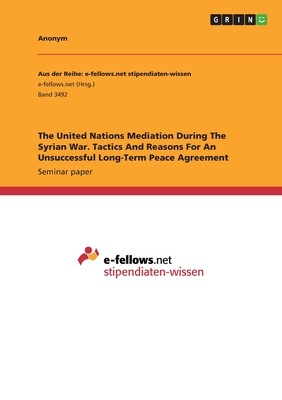
- We will send in 10–14 business days.
- Author: Anonym
- Publisher: GRIN Verlag
- Year: 2020
- Pages: 26
- ISBN-10: 3346202038
- ISBN-13: 9783346202031
- Format: 14.8 x 21 x 0.2 cm, minkšti viršeliai
- Language: English
- SAVE -10% with code: EXTRA
The United Nations Mediation During The Syrian War. Tactics And Reasons For An Unsuccessful Long-Term Peace Agreement (e-book) (used book) | bookbook.eu
Reviews
Description
Seminar paper from the year 2019 in the subject Politics - International Politics - Region: Near East, Near Orient, grade: 1,7, Free University of Berlin (Otto-Suhr-Institut), course: Authoritarianism in International Politics, language: English, abstract: This paper examines the chronology of the UN mediation launched in Syria in 2012 and the different tactics that were used by the mediators. It then analyses why the mediation was not successful at finding a long-term peace agreement. To lay the foundations, the first chapter depicts the circumstances of the war and the course of the peace process. Then a UN document is presented, which serves as a guide for successful mediation. To answer the research question, the analyses of several authors regarding the UN mediation will be summarized to find out at which point the Syrian mediation did not correspond to the guide. In the third part of the paper, the political system of Syria is identified in an authoritarian typology. In the discussion I will reflect on whether the traditional classification is sufficient or to which extent its potential shortcomings could also represent a problematic approach to the mediation process. This would be decisive for our understanding of the failure. The conclusion will summarize the explanations as analyzed in the research field and the findings of the discussion as well as the consequences this analysis has for further research.
EXTRA 10 % discount with code: EXTRA
The promotion ends in 21d.21:35:54
The discount code is valid when purchasing from 10 €. Discounts do not stack.
- Author: Anonym
- Publisher: GRIN Verlag
- Year: 2020
- Pages: 26
- ISBN-10: 3346202038
- ISBN-13: 9783346202031
- Format: 14.8 x 21 x 0.2 cm, minkšti viršeliai
- Language: English English
Seminar paper from the year 2019 in the subject Politics - International Politics - Region: Near East, Near Orient, grade: 1,7, Free University of Berlin (Otto-Suhr-Institut), course: Authoritarianism in International Politics, language: English, abstract: This paper examines the chronology of the UN mediation launched in Syria in 2012 and the different tactics that were used by the mediators. It then analyses why the mediation was not successful at finding a long-term peace agreement. To lay the foundations, the first chapter depicts the circumstances of the war and the course of the peace process. Then a UN document is presented, which serves as a guide for successful mediation. To answer the research question, the analyses of several authors regarding the UN mediation will be summarized to find out at which point the Syrian mediation did not correspond to the guide. In the third part of the paper, the political system of Syria is identified in an authoritarian typology. In the discussion I will reflect on whether the traditional classification is sufficient or to which extent its potential shortcomings could also represent a problematic approach to the mediation process. This would be decisive for our understanding of the failure. The conclusion will summarize the explanations as analyzed in the research field and the findings of the discussion as well as the consequences this analysis has for further research.


Reviews